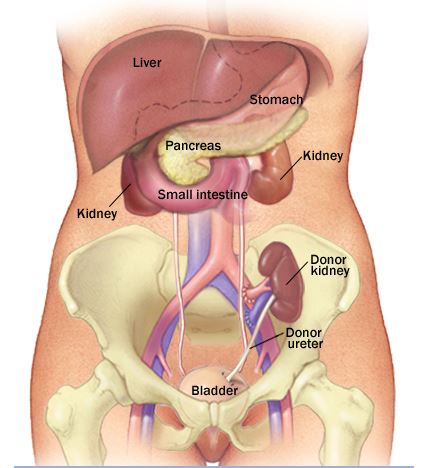Kidney Disease
Chronic kidney disease is a major health concern in this country afflicting more than eight million Americans. When kidney function declines to a certain level, patients have end-stage renal disease and require either dialysis or transplantation to sustain their life. Currently more than 340,000 people are on dialysis, with 106,000 new patients added in 2006. Over 140,000 people are living with a functioning kidney transplant (source: www.usrdsrg). The prevalence of these two populations of end-stage renal disease has tripled in the last 20 years. Medicare expenditure for end-stage renal disease is expected to exceed $28 billion in 2010.
Normal Kidney Function
The kidneys are organs whose function is essential to maintain life. Most people are born with two kidneys, located on either side of the spine, behind the abdominal organs and below the rib cage. The kidneys perform several major functions to keep the body healthy.
- Filtration of the blood to remove waste products from normal body functions, passing the waste from the body as urine, and returning water and chemicals back to the body as necessary.
- Regulation of the blood pressure by releasing several hormones.
- Stimulation of production of red blood cells by releasing the hormone erythropoietin.
The normal anatomy of the kidneys involves two kidney bean shaped organs that produce urine. Urine is then carried to the bladder by way of the ureters. The bladder serves as a storehouse for the urine. When the body senses that the bladder is full, the urine is excreted from the bladder through the urethra.
Kidney Disease
When the kidneys stop working, renal failure occurs. If this renal failure continues (chronically), end-stage renal disease results, with accumulation of toxic waste products in the body. In this case, either dialysis or transplantation is required.
Common Causes of End-Stage Renal Disease
- Diabetes mellitus
- High blood pressure
- Glomerulonephritis
- Polycystic Kidney Disease
- Severe anatomical problems of the urinary trac



